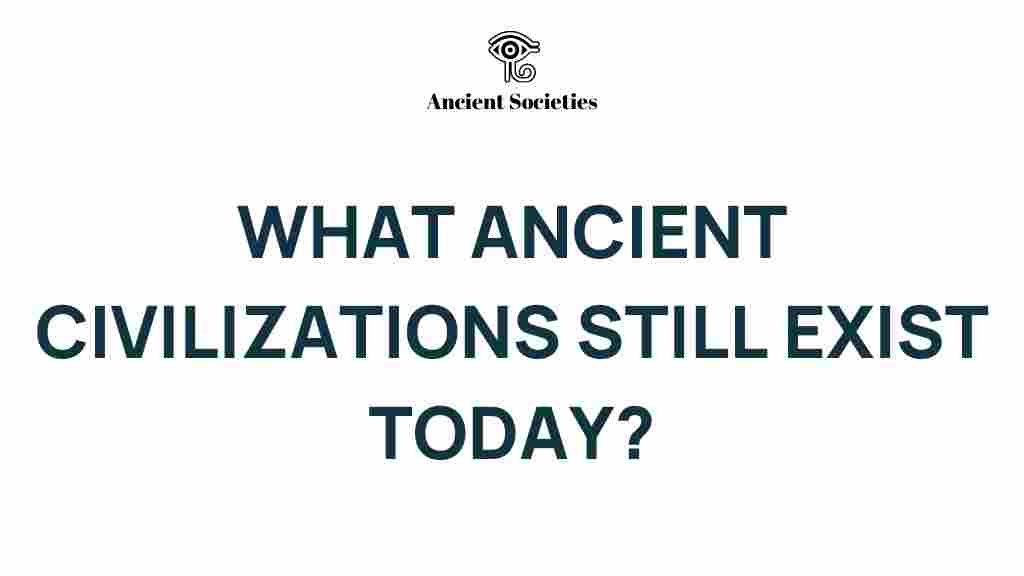Unveiling the Hidden Legacies of Ancient Civilizations Today
The study of ancient civilizations provides a window into our collective past, revealing how the achievements and failures of those who came before us continue to shape modern societies. From the architectural wonders of the Egyptians to the philosophical musings of the Greeks, the history of human development is intricately tied to the cultural heritage left behind by these civilizations. In this article, we will explore the hidden legacies of ancient civilizations, the importance of archaeology, and the influence these legacies have on our current world.
The Importance of Understanding Ancient Civilizations
Understanding ancient civilizations is crucial for several reasons:
- Cultural Identity: Many modern societies derive their cultural identities from ancient traditions.
- Lessons from History: The successes and failures of past societies offer invaluable lessons for contemporary governance, economics, and social structure.
- Preservation of Knowledge: Ancient texts, artifacts, and monuments hold knowledge that can inform various fields such as science, philosophy, and art.
Exploration of Ancient Civilizations
The exploration of ancient civilizations has been a key focus in the fields of anthropology and archaeology. Scholars and researchers dedicate their lives to uncovering the remnants of societies long gone. This exploration involves:
- Field Excavations: Archaeologists dig at sites believed to be rich in artifacts and knowledge.
- Artifact Analysis: Tools, pottery, and artwork are analyzed to understand the daily lives and beliefs of ancient peoples.
- Historical Documentation: Historical texts and records are studied to provide context to the findings.
Historical Influence of Ancient Civilizations on Modern Societies
The legacies of ancient civilizations have a profound impact on modern societies. Here are some key areas where this influence is evident:
1. Architecture and Urban Planning
Many cities today still reflect the architectural styles and urban planning principles established by ancient societies. For example:
- Greek Columns: The use of Doric, Ionic, and Corinthian columns can be seen in numerous government buildings.
- Roman Roads: The layout of modern road networks is often inspired by the strategic planning of Roman roads.
2. Governance and Law
Modern legal systems have their roots in the laws established by ancient civilizations:
- Code of Hammurabi: One of the earliest written legal codes, influencing modern interpretations of justice.
- Roman Law: The basis for many legal systems in Europe and beyond.
3. Language and Literature
The languages we speak and the literary traditions we cherish are heavily influenced by ancient texts:
- Latin and Greek: The foundations of many modern languages, including English.
- Epic Poetry: Works like Homer’s Iliad inspired countless authors throughout history.
4. Scientific and Philosophical Foundations
Ancient civilizations made significant contributions to science and philosophy that still resonate today:
- Mathematics: The number system developed by the Babylonians and Egyptians laid the groundwork for modern mathematics.
- Philosophy: Greek philosophers like Socrates and Plato remain influential in contemporary thought.
The Role of Archaeology in Uncovering Legacies
Archaeology plays a vital role in uncovering the hidden legacies of ancient civilizations. Through systematic excavation and analysis, archaeologists can piece together the lives of people from the past. Here’s how:
Step-by-Step Process in Archaeological Excavation
- Site Selection: Identifying potential sites based on historical records and geographical features.
- Surveying: Conducting surface surveys to find artifacts and features.
- Excavation: Carefully digging to uncover layers of history.
- Cataloging: Documenting and analyzing artifacts found during excavations.
- Publishing Findings: Sharing discoveries with the broader community through reports and academic journals.
Troubleshooting Common Challenges in Archaeology
Archaeologists often face challenges that can hinder their work. Here are some common issues and tips to address them:
- Site Preservation: Natural erosion or human development can threaten sites. Advocating for preservation and protection is crucial.
- Funding Limitations: Archaeological projects often rely on grants. Diversifying funding sources can help sustain research.
- Interdisciplinary Collaboration: Working with experts in related fields (e.g., anthropology, history) can enhance research quality.
Legacy of Ancient Civilizations in Modern Culture
The legacy of ancient civilizations is not just limited to science and governance; it permeates modern culture in various ways:
1. Art and Aesthetics
Many modern artists draw inspiration from ancient art forms, incorporating styles and themes into their work. This melding of the old and new enriches contemporary culture.
2. Festivals and Traditions
Many cultural traditions and festivals can trace their roots back to ancient practices:
- Harvest Festivals: Celebrations of the harvest can be linked to agricultural practices of ancient societies.
- Religious Rituals: Many religious practices have origins in ancient belief systems.
3. Education and Public Engagement
Institutions and museums play a crucial role in educating the public about ancient civilizations. Engaging exhibits and educational programs help foster a deeper understanding of our cultural heritage.
Conclusion
As we delve into the hidden legacies of ancient civilizations, we uncover a wealth of knowledge and experience that continues to influence our modern societies. From architecture to philosophy, the impact of these civilizations is undeniable, reminding us of the importance of preserving our cultural heritage and learning from history. Through the efforts of archaeologists and researchers, we can continue to explore and understand the depths of our past, ensuring that the legacies of those who came before us are not forgotten.
For further reading on the topic of archaeology and its impact on understanding ancient civilizations, visit this resource. Additionally, if you wish to explore ongoing archaeological projects, check out this link for more information.
This article is in the category History and created by AncientSocieties Team
